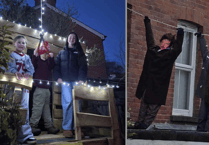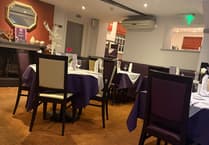THE father of a child genius has vowed to fight a Local Education Authority (LEA) Attendance Order compelling him to send the boy back to school. Peter Williams senior says he will not force his son to go to a school that the family considers to be unsuitable and which will not recognise and cater for his very considerable talents. At just 11 years of age, Peter junior's one ambition in life is to become World Chess Champion. He is currently Britain's best Under-14s player, in line to represent the United Kingdom in the forthcoming European, and possibly the world, championships this autumn. He competes regularly at adult level, often beating established chess masters. Just before Christmas last year, Peter appeared on the Channel Four programme Child Genius. He was one of a handful of gifted children whose lives were scrutinised by the camera. It was the first in a series of programmes that will trace the progress and development of these children up to the age of 18, looking at how society treats them and what they actually manage to achieve. With a proven IQ of 170 - which puts Peter junior in the top 0.03 per cent of the population- his is a rare and gifted intellect. In a letter to the family following the assessment, London-based Professor Joan Freeman writes: "Peter scored the top IQ possible - 170. The test-makers call this very superior. I would call him gifted. He is certainly capable of achieving extremely well in education." But, like several of his counterparts featured by the programme, so focused is he on this talent and so determined is he to succeed, that it became a problem at school, and so Peter junior is now educated at home. His departure from mainstream education occurred four years ago, when his previous school, St Lawrence Church of England Primary School, felt unable to allow him time off during the week to study chess for fear of setting a precedent. Determined to do the best for his son, Mr Williams gave up his job to take on the role of home tutor and his mother, Carol, went out to work. Since then, according to Peter senior, progress has been excellent and his son is now working at senior level, while attending regular chess coaching sessions, needed if he is to fulfil his potential. The LEA has been concerned by the family's decision to educate Peter at home. And now, despite the authority having been sent examples of his work, his parents have been served an order demanding his attendance at Andrew's Endowed Church of England Primary School in Holybourne, which it is said would be happy to accommodate the needs of a gifted child. But Peter does not want to return to school and, says Mr Williams, the school is reluctant to accept him under these terms, believing that the child should not be forced into attending. "The LEA shouldn't be wasting taxpayers' money on pursuing us when we are doing nothing wrong. It is perfectly legal to teach your child at home." He adds that he has sent evidence of his son's work to the LEA, which has refused to accept it. Instead, the inspector wants to visit the family at home so that he can interview Peter and witness him working at first hand. But for Mr Williams this is unacceptably intrusive, a line over which he is not prepared to step. He says if his son wants to return to school then he will support him in that decision, but if he doesn't he is prepared "to fight tooth and nail" for the right to continue his education at home.



